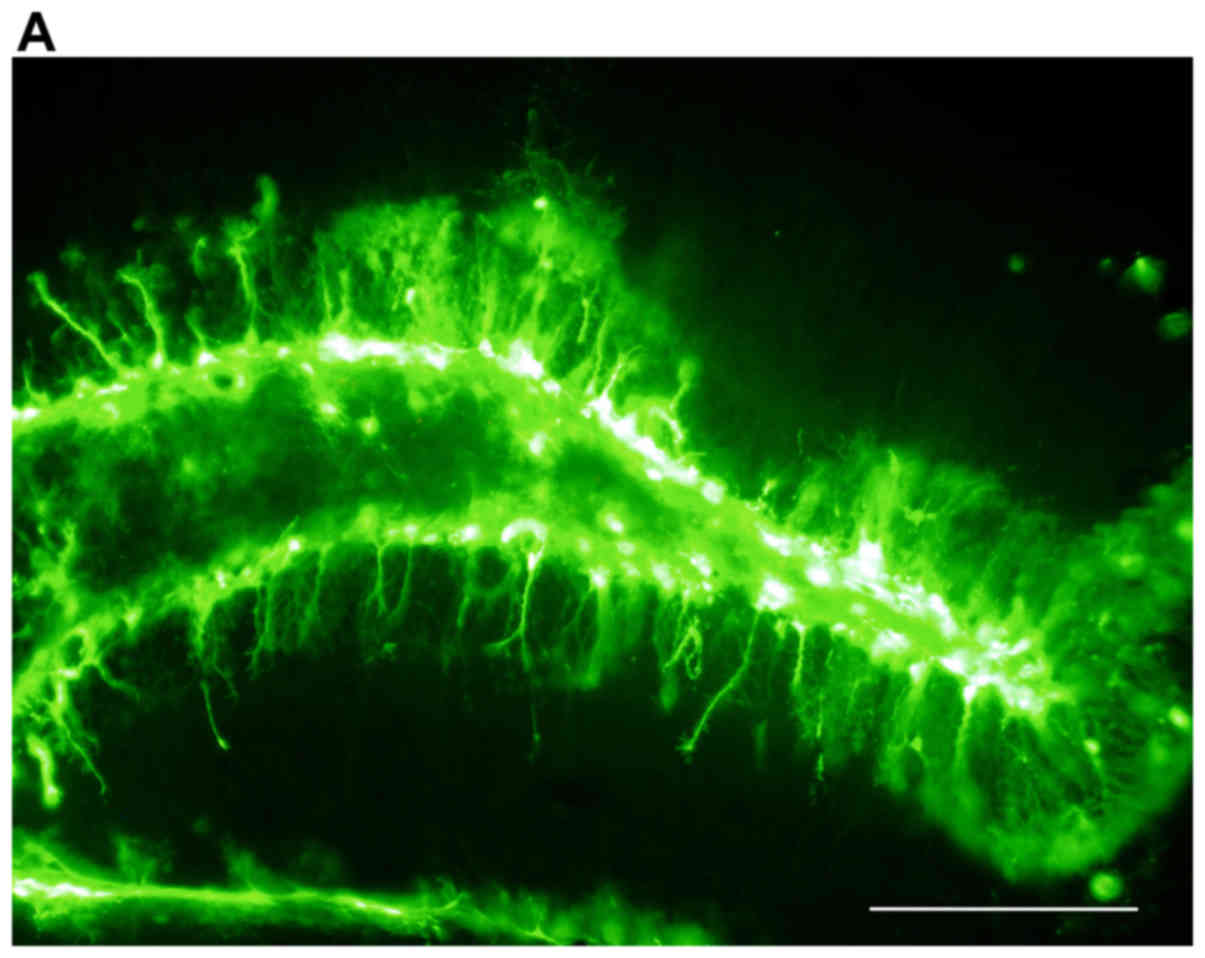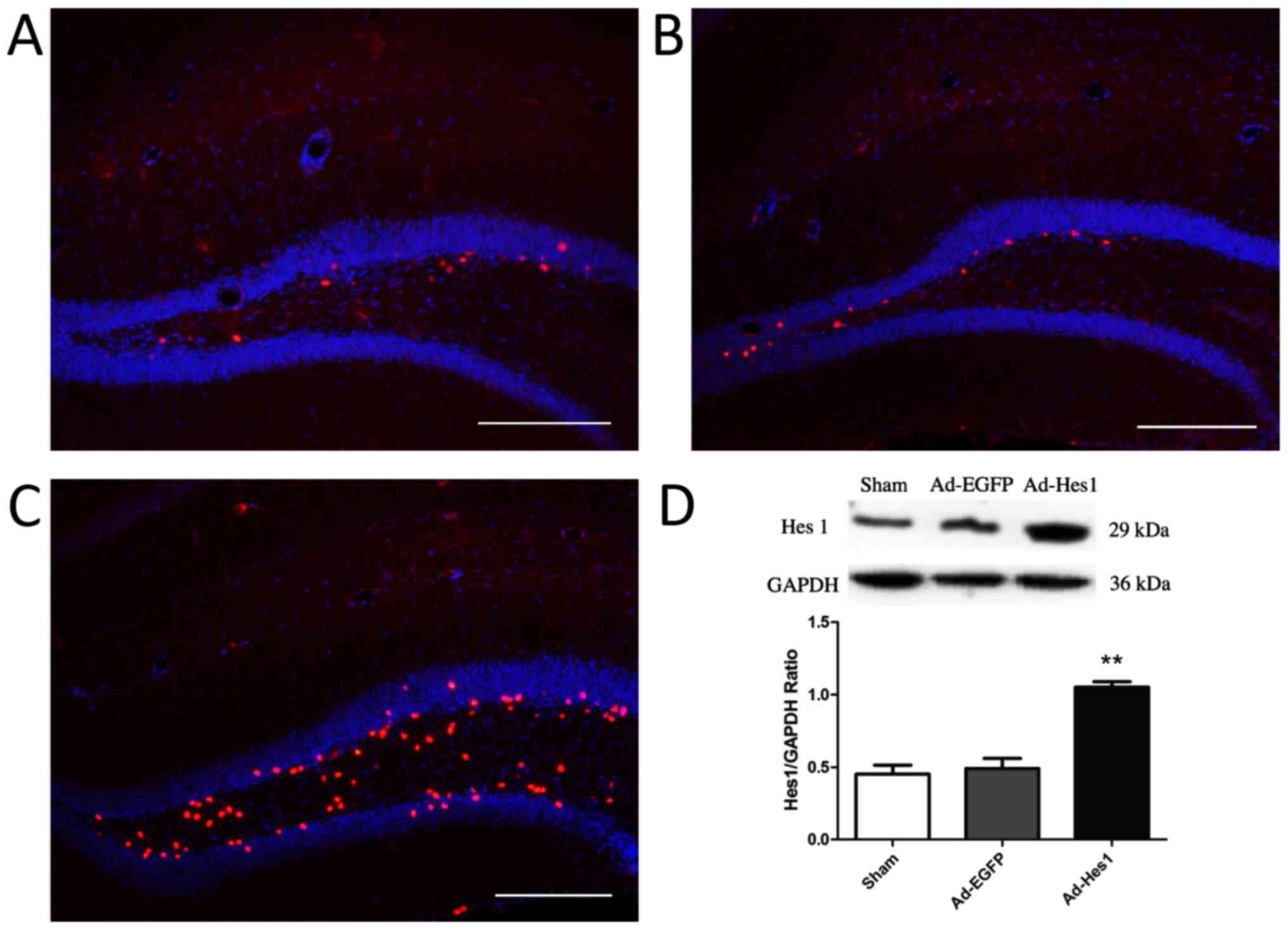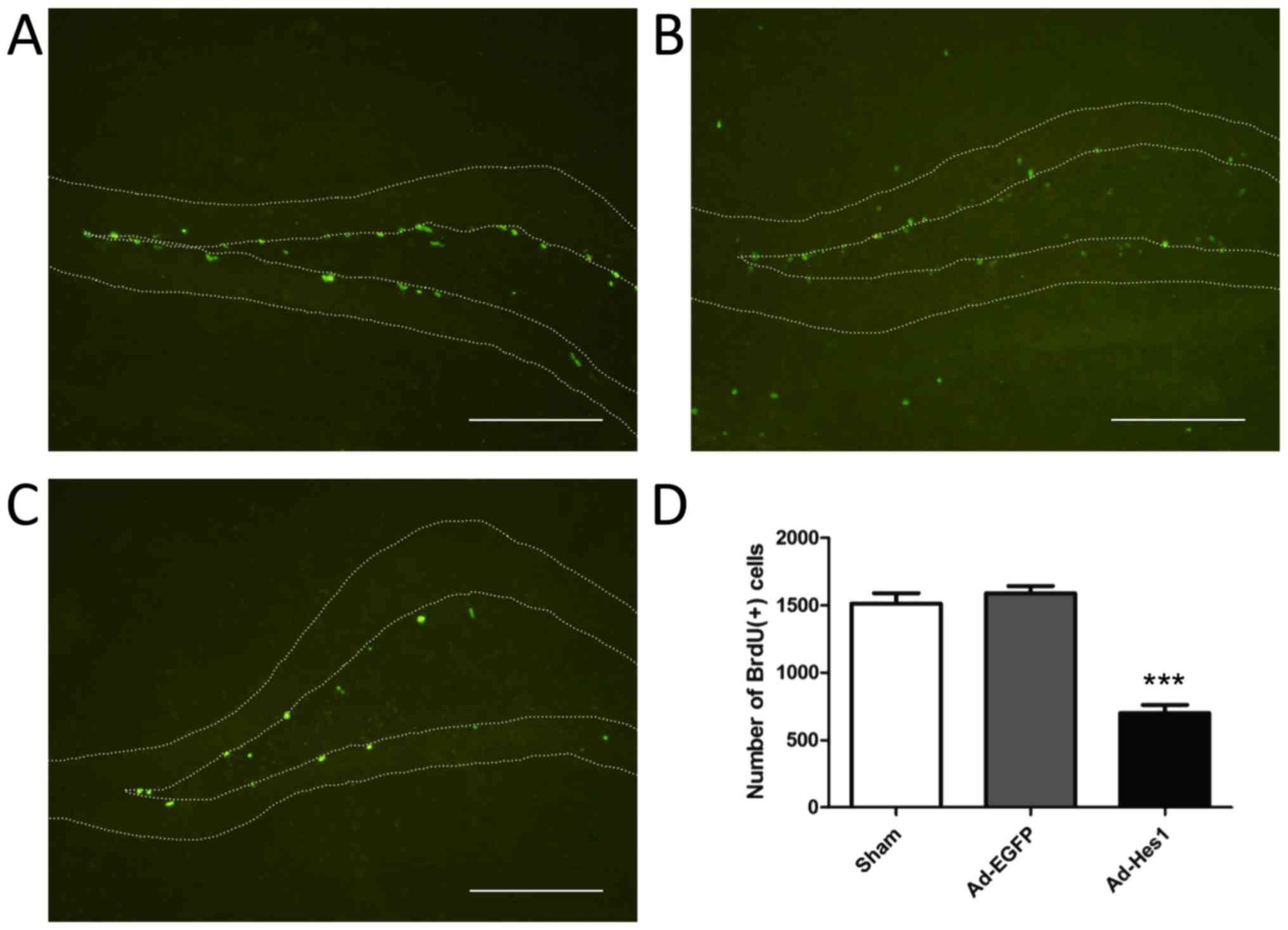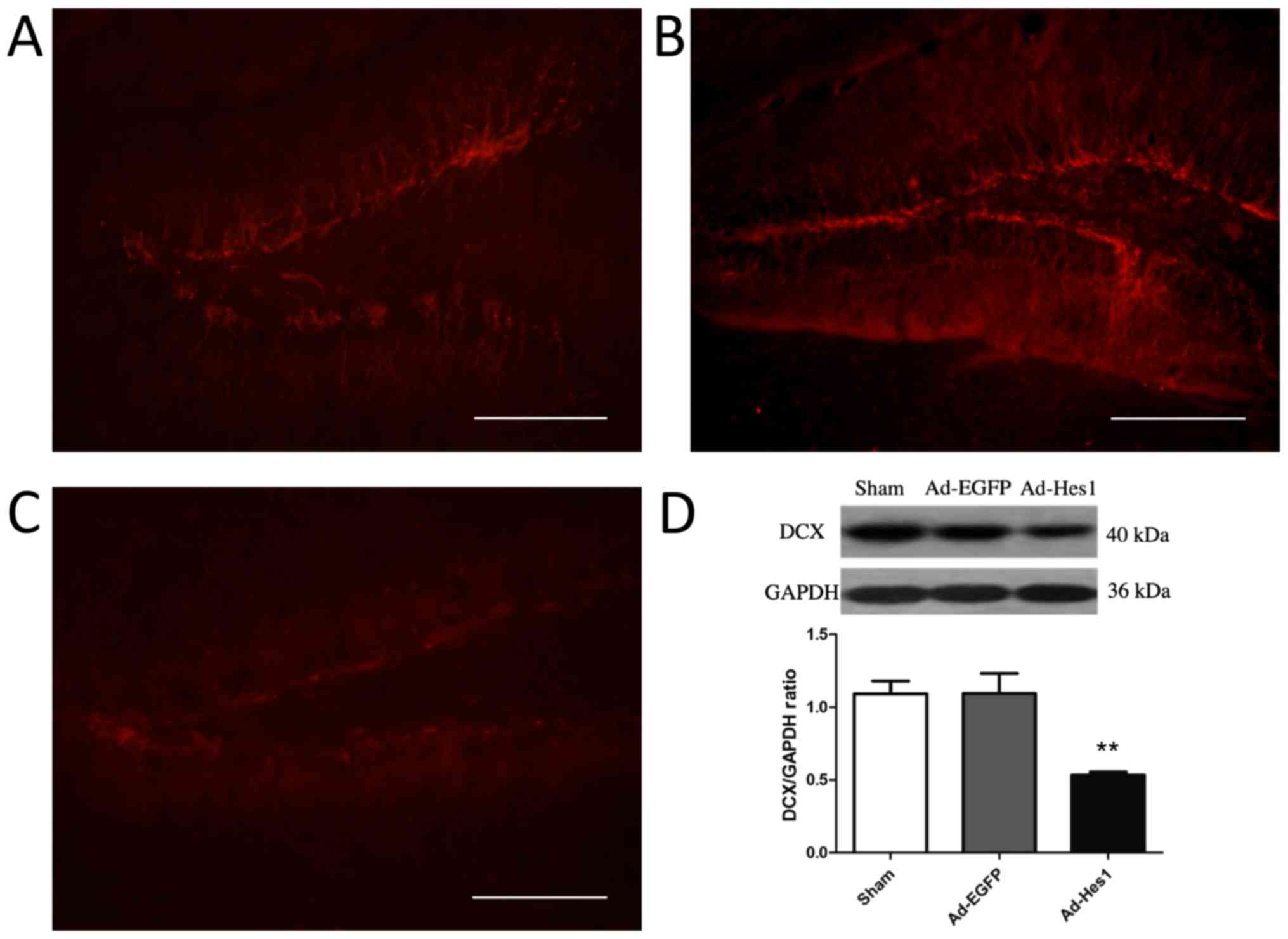|
1
|
Kageyama R and Ohtsuka T: The Notch-Hes
pathway in mammalian neural development. Cell Res. 9:179–188. 1999.
View Article : Google Scholar : PubMed/NCBI
|
|
2
|
Radtke F and Raj K: The role of Notch in
tumorigenesis: Oncogene or tumour suppressor? Nat Rev Cancer.
3:756–767. 2003. View
Article : Google Scholar : PubMed/NCBI
|
|
3
|
Hatakeyama J, Bessho Y, Katoh K, Ookawara
S, Fujioka M, Guillemot F and Kageyama R: Hes genes regulate size,
shape and histogenesis of the nervous system by control of the
timing of neural stem cell differentiation. Development.
131:5539–5550. 2004. View Article : Google Scholar : PubMed/NCBI
|
|
4
|
Kageyama R, Ohtsuka T and Tomita K: The
bHLH gene Hes1 regulates differentiation of multiple cell types.
Mol Cells. 10:1–7. 2000. View Article : Google Scholar : PubMed/NCBI
|
|
5
|
Nakao K and Campos-Ortega JA: Persistent
expression of genes of the enhancer of split complex suppresses
neural development in Drosophila. Neuron. 16:275–286. 1996.
View Article : Google Scholar : PubMed/NCBI
|
|
6
|
Sasai Y, Kageyama R, Tagawa Y, Shigemoto R
and Nakanishi S: Two mammalian helix-loop-helix factors
structurally related to Drosophila hairy and Enhancer of split.
Genes Dev. 6:2620–2634. 1992. View Article : Google Scholar : PubMed/NCBI
|
|
7
|
Ishibashi M, Ang SL, Shiota K, Nakanishi
S, Kageyama R and Guillemot F: Targeted disruption of mammalian
hairy and Enhancer of split homolog-1 (HES-1) leads to
up-regulation of neural helix-loop-helix factors, premature
neurogenesis, and severe neural tube defects. Genes Dev.
9:3136–3148. 1995. View Article : Google Scholar : PubMed/NCBI
|
|
8
|
Bai G, Sheng N, Xie Z, Bian W, Yokota Y,
Benezra R, Kageyama R, Guillemot F and Jing N: Id sustains Hes1
expression to inhibit precocious neurogenesis by releasing negative
autoregulation of Hes1. Dev Cell. 13:283–297. 2007. View Article : Google Scholar : PubMed/NCBI
|
|
9
|
Baek JH, Hatakeyama J, Sakamoto S, Ohtsuka
T and Kageyama R: Persistent and high levels of Hes1 expression
regulate boundary formation in the developing central nervous
system. Development. 133:2467–276. 2006. View Article : Google Scholar : PubMed/NCBI
|
|
10
|
Chapouton P, Webb KJ, Stigloher C, Alunni
A, Adolf B, Hesl B, Topp S, Kremmer E and Bally-Cuif L: Expression
of hairy/enhancer of split genes in neural progenitors and
neurogenesis domains of the adult zebrafish brain. J Comp Neurol.
519:1748–1769. 2011. View Article : Google Scholar : PubMed/NCBI
|
|
11
|
Wang Y, Chan SL, Miele L, Yao PJ, Mackes
J, Ingram DK, Mattson MP and Furukawa K: Involvement of Notch
signaling in hippocampal synaptic plasticity. Proc Natl Acad Sci
USA. 101:9458–9462. 2004. View Article : Google Scholar : PubMed/NCBI
|
|
12
|
Berezovska O, Xia MQ and Hyman BT: Notch
is expressed in adult brain, is coexpressed with presenilin-1, and
is altered in Alzheimer disease. J Neuropathol Exp Neurol.
57:738–745. 1998. View Article : Google Scholar : PubMed/NCBI
|
|
13
|
John GR, Shankar SL, Shafit-Zagardo B,
Massimi A, Lee SC, Raine CS and Brosnan CF: Multiple sclerosis:
Re-expression of a developmental pathway that restricts
oligodendrocyte maturation. Nat Med. 8:1115–1121. 2002. View Article : Google Scholar : PubMed/NCBI
|
|
14
|
Chirumamilla S, Sun D, Bullock MR and
Colello RJ: Traumatic brain injury induced cell proliferation in
the adult mammalian central nervous system. J Neurotrauma.
19:693–703. 2002. View Article : Google Scholar : PubMed/NCBI
|
|
15
|
Richardson RM, Sun D and Bullock MR:
Neurogenesis after traumatic brain injury. Neurosurg Clin N Am.
18:169–181, xi. 2007. View Article : Google Scholar : PubMed/NCBI
|
|
16
|
Yu X, Alder JK, Chun JH, Friedman AD,
Heimfeld S, Cheng L and Civin CI: HES1 inhibits cycling of
hematopoietic progenitor cells via DNA binding. Stem Cells.
24:876–888. 2006. View Article : Google Scholar : PubMed/NCBI
|
|
17
|
Sang L, Coller HA and Roberts JM: Control
of the reversibility of cellular quiescence by the transcriptional
repressor HES1. Science. 321:1095–1100. 2008. View Article : Google Scholar : PubMed/NCBI
|
|
18
|
Ridet JL, Malhotra SK, Privat A and Gage
FH: Reactive astrocytes: Cellular and molecular cues to biological
function. Trends Neurosci. 20:570–577. 1997. View Article : Google Scholar : PubMed/NCBI
|
|
19
|
Monje ML, Toda H and Palmer TD:
Inflammatory blockade restores adult hippocampal neurogenesis.
Science. 302:1760–1765. 2003. View Article : Google Scholar : PubMed/NCBI
|
|
20
|
Prozorovski T, Schulze-Topphoff U, Glumm
R, Baumgart J, Schröter F, Ninnemann O, Siegert E, Bendix I,
Brüstle O, Nitsch R, et al: Sirt1 contributes critically to the
redox-dependent fate of neural progenitors. Nat Cell Biol.
10:385–394. 2008. View
Article : Google Scholar : PubMed/NCBI
|
|
21
|
Thomas CE, Edwards P, Wickham TJ, Castro
MG and Lowenstein PR: Adenovirus binding to the coxsackievirus and
adenovirus receptor or integrins is not required to elicit brain
inflammation but is necessary to transduce specific neural cell
types. J Virol. 76:3452–3460. 2002. View Article : Google Scholar : PubMed/NCBI
|
|
22
|
Einfeld DA, Brough DE, Roelvink PW,
Kovesdi I and Wickham TJ: Construction of a pseudoreceptor that
mediates transduction by adenoviruses expressing a ligand in fiber
or penton base. J Virol. 73:9130–9136. 1999.PubMed/NCBI
|
|
23
|
Kirby I, Davison E, Beavil AJ, Soh CP,
Wickham TJ, Roelvink PW, Kovesdi I, Sutton BJ and Santis G:
Mutations in the DG loop of adenovirus type 5 fiber knob protein
abolish high-affinity binding to its cellular receptor CAR. J
Virol. 73:9508–9514. 1999.PubMed/NCBI
|
|
24
|
Schmidt A, Böckmann M, Stoll A, Racek T
and Pützer BM: Analysis of adenovirus gene transfer into adult
neural stem cells. Virus Res. 114:45–53. 2005. View Article : Google Scholar : PubMed/NCBI
|
|
25
|
Schmidt A, Haas SJ, Hildebrandt S, Scheibe
J, Eckhoff B, Racek T, Kempermann G, Wree A and Pützer BM:
Selective targeting of adenoviral vectors to neural precursor cells
in the hippocampus of adult mice: New prospects for in situ gene
therapy. Stem Cells. 25:2910–2918. 2007. View Article : Google Scholar : PubMed/NCBI
|
|
26
|
Thompson HJ, Lifshitz J, Marklund N, Grady
MS, Graham DI, Hovda DA and McIntosh TK: Lateral fluid percussion
brain injury: A 15-year review and evaluation. J Neurotrauma.
22:42–75. 2005. View Article : Google Scholar : PubMed/NCBI
|
|
27
|
Wojtowicz JM and Kee N: BrdU assay for
neurogenesis in rodents. Nat Protoc. 1:1399–1405. 2006. View Article : Google Scholar : PubMed/NCBI
|
|
28
|
Alvarez-Buylla A and Lim DA: For the long
run: Maintaining germinal niches in the adult brain. Neuron.
41:683–686. 2004. View Article : Google Scholar : PubMed/NCBI
|
|
29
|
Lie DC, Song H, Colamarino SA, Ming GL and
Gage FH: Neurogenesis in the adult brain: New strategies for
central nervous system diseases. Annu Rev Pharmacol Toxicol.
44:399–421. 2004. View Article : Google Scholar : PubMed/NCBI
|
|
30
|
Ramaswamy S, Goings GE, Soderstrom KE,
Szele FG and Kozlowski DA: Cellular proliferation and migration
following a controlled cortical impact in the mouse. Brain Res.
1053:38–53. 2005. View Article : Google Scholar : PubMed/NCBI
|
|
31
|
Urrea C, Castellanos DA, Sagen J, Tsoulfas
P, Bramlett HM and Dietrich WD: Widespread cellular proliferation
and focal neurogenesis after traumatic brain injury in the rat.
Restor Neurol Neurosci. 25:65–76. 2007.PubMed/NCBI
|
|
32
|
Kernie SG and Parent JM: Forebrain
neurogenesis after focal Ischemic and traumatic brain injury.
Neurobiol Dis. 37:267–274. 2010. View Article : Google Scholar : PubMed/NCBI
|
|
33
|
Richardson RM, Singh A, Sun D, Fillmore
HL, Dietrich DW III and Bullock MR: Stem cell biology in traumatic
brain injury: Effects of injury and strategies for repair. J
Neurosurg. 112:1125–1138. 2010. View Article : Google Scholar : PubMed/NCBI
|
|
34
|
Ninkovic J and Götz M: Signaling in adult
neurogenesis: From stem cell niche to neuronal networks. Curr Opin
Neurobiol. 17:338–344. 2007. View Article : Google Scholar : PubMed/NCBI
|
|
35
|
Suh H, Deng W and Gage FH: Signaling in
adult neurogenesis. Annu Rev Cell Dev Biol. 25:253–275. 2009.
View Article : Google Scholar : PubMed/NCBI
|
|
36
|
Anderson WF: Human gene therapy. Nature.
392 6679 Suppl:S25–S30. 1998.
|
|
37
|
Cartmell T, Southgate T, Rees GS, Castro
MG, Lowenstein PR and Luheshi GN: Interleukin-1 mediates a rapid
inflammatory response after injection of adenoviral vectors into
the brain. J Neurosci. 19:1517–1523. 1999. View Article : Google Scholar : PubMed/NCBI
|
|
38
|
Thomas CE, Birkett D, Anozie I, Castro MG
and Lowenstein PR: Acute direct adenoviral vector cytotoxicity and
chronic, but not acute, inflammatory responses correlate with
decreased vector-mediated transgene expression in the brain. Mol
Ther. 3:36–46. 2001. View Article : Google Scholar : PubMed/NCBI
|
|
39
|
Lowenstein PR, Mandel RJ, Xiong WD,
Kroeger K and Castro MG: Immune responses to adenovirus and
adeno-associated vectors used for gene therapy of brain diseases:
The role of immunological synapses in understanding the cell
biology of neuroimmune interactions. Curr Gene Ther. 7:347–360.
2007. View Article : Google Scholar : PubMed/NCBI
|
|
40
|
Yan R, Zhang L, Zhang Q, Li J, Kang X,
Wang H, Zhang J, Yang S and Yang X: A new finding concerning
adenoviral-mediated gene transfer: A high-level, cell-specific
transgene expression in the neural stem cells of adult mice. J
Virol Methods. 186:1–6. 2012. View Article : Google Scholar : PubMed/NCBI
|
|
41
|
Brown JP, Couillard-Després S, Cooper-Kuhn
CM, Winkler J, Aigner L and Kuhn HG: Transient expression of
doublecortin during adult neurogenesis. J Comp Neurol. 467:1–10.
2003. View Article : Google Scholar : PubMed/NCBI
|
|
42
|
Yu TS, Zhang G, Liebl DJ and Kernie SG:
Traumatic brain injury-induced hippocampal neurogenesis requires
activation of early nestin-expressing progenitors. J Neurosci.
28:12901–12912. 2008. View Article : Google Scholar : PubMed/NCBI
|
|
43
|
Taupin P: BrdU immunohistochemistry for
studying adult neurogenesis: Paradigms, pitfalls, limitations, and
validation. Brain Res Rev. 53:198–214. 2007. View Article : Google Scholar : PubMed/NCBI
|


















